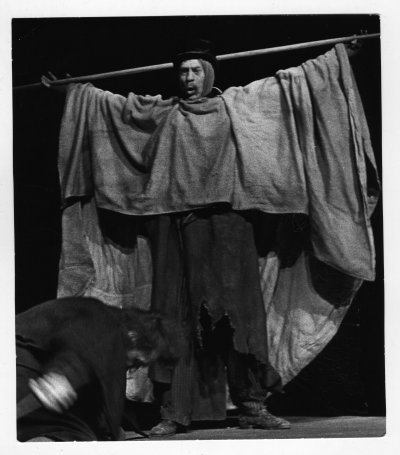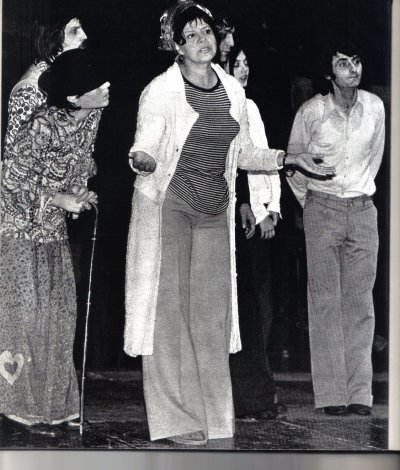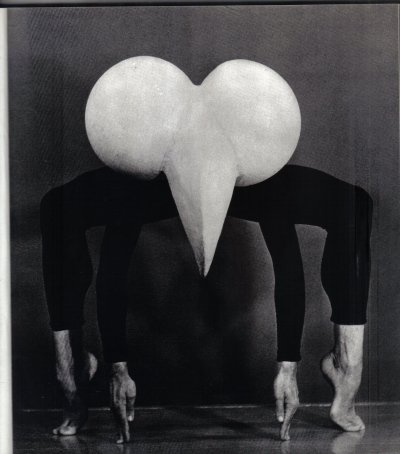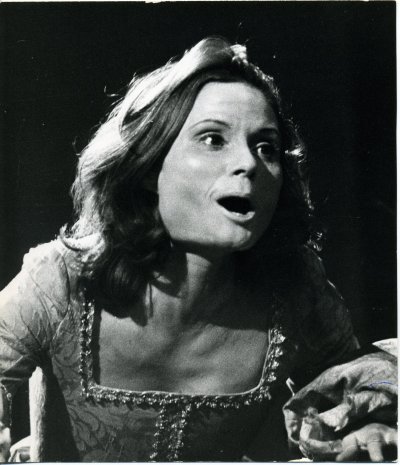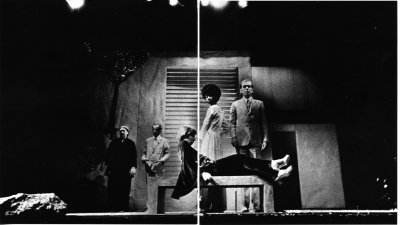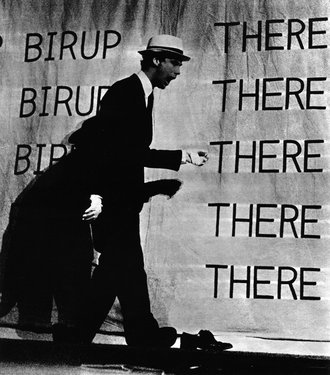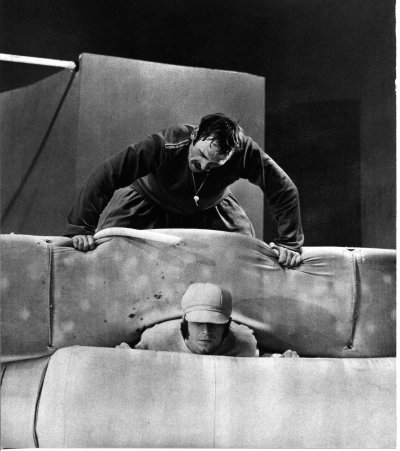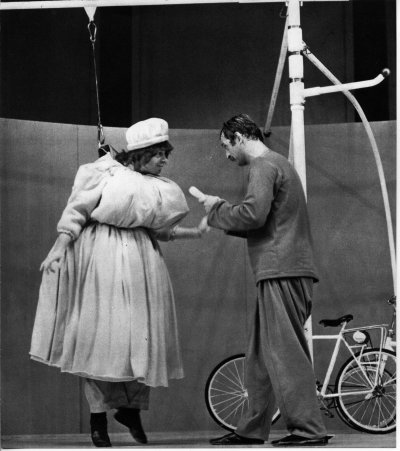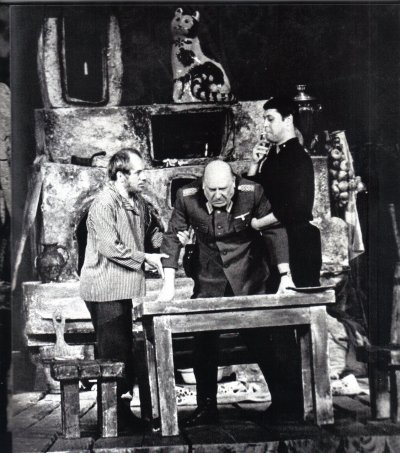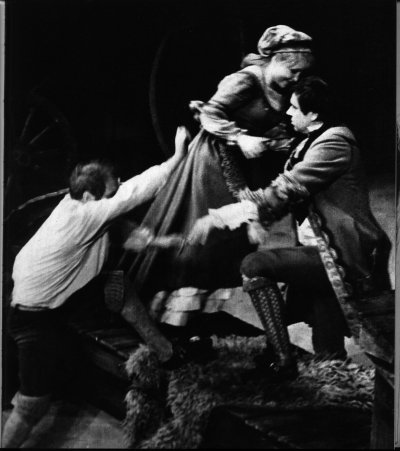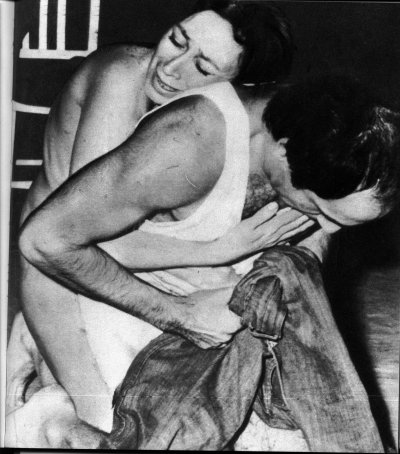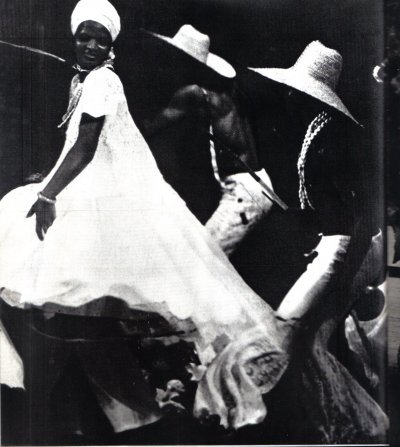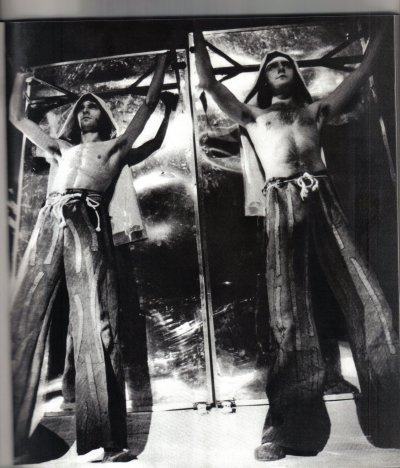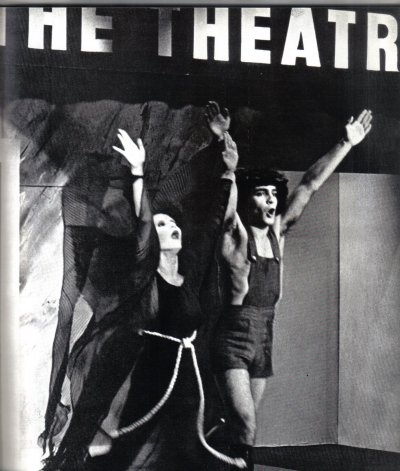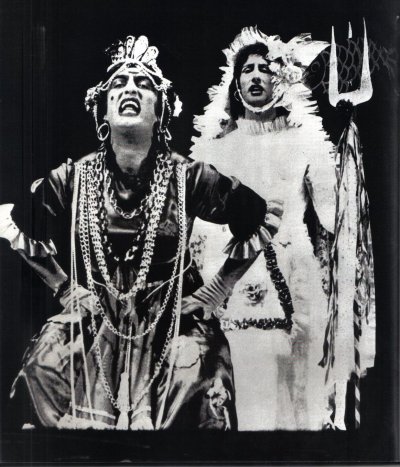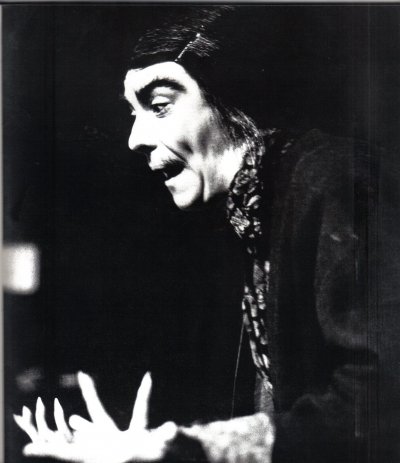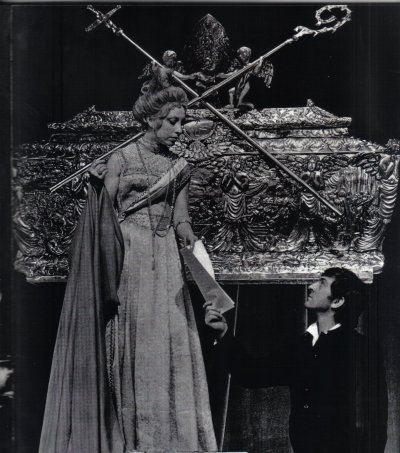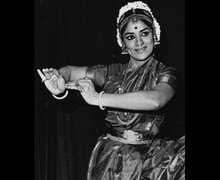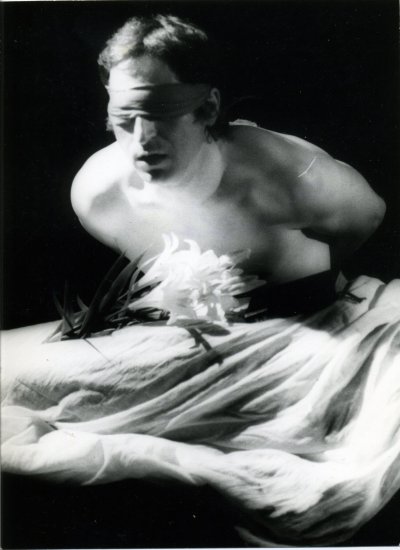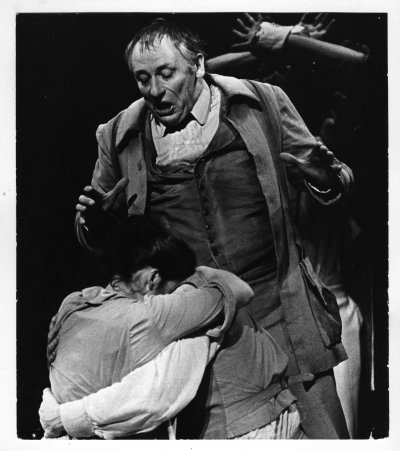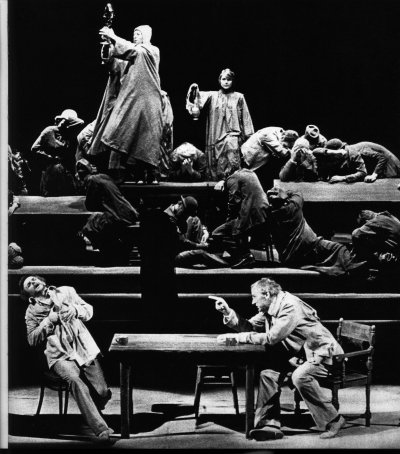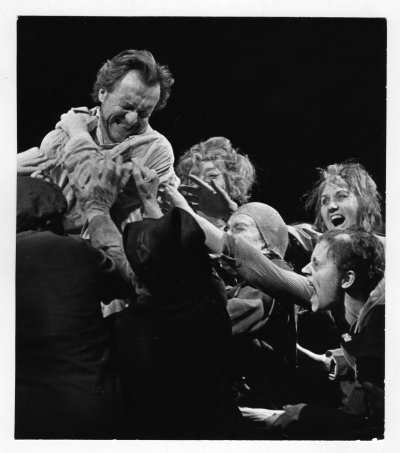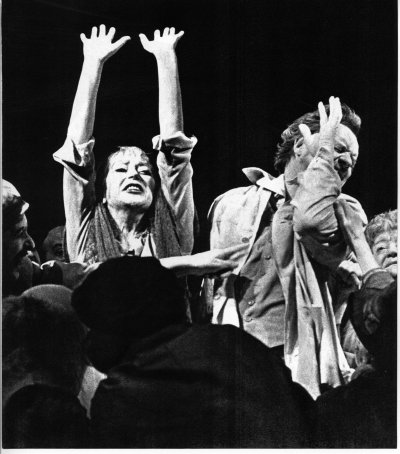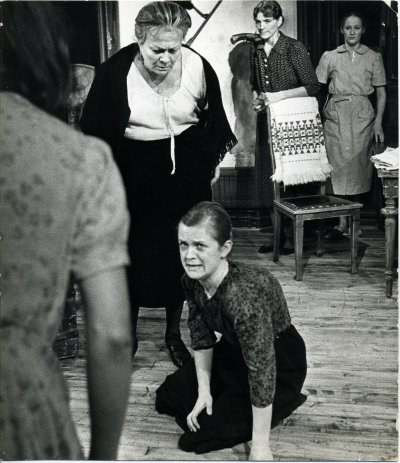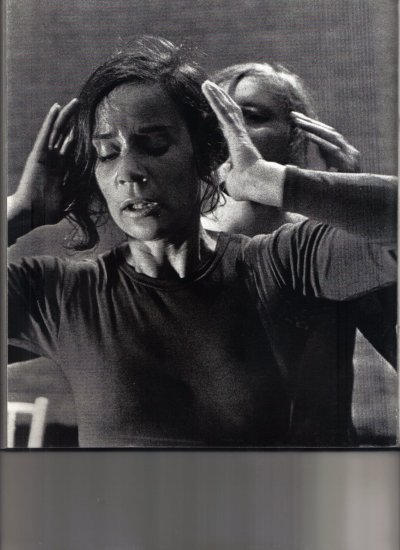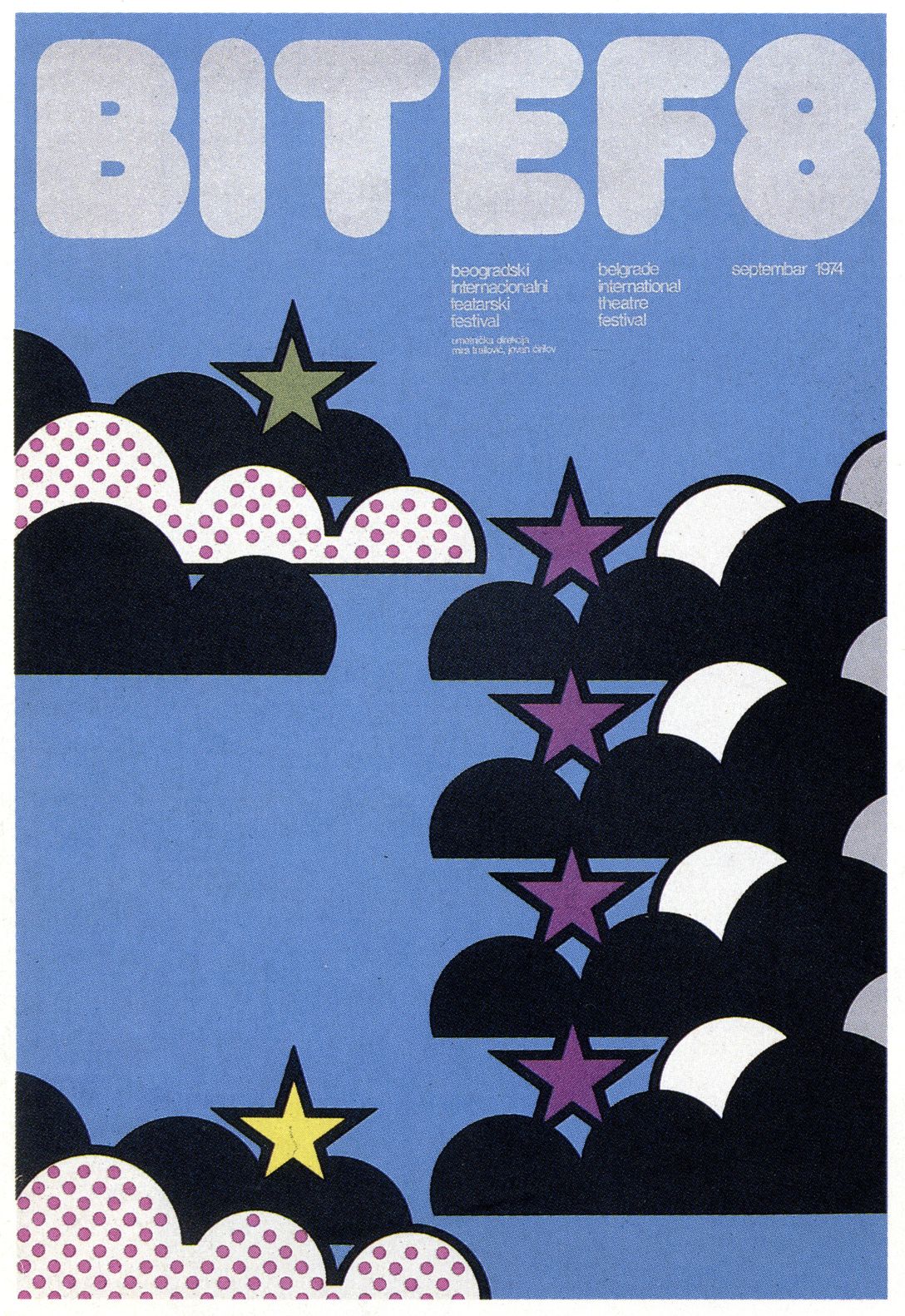
Dizajn / Design: Saveta Mašić / Slobodan Mašić (1939-2016)
Već nekoliko sezona pozorište – u većoj meri nego ranije – počinje da se bavi samim sobom. Ispituje granice svojih mogućnosti, u svojoj istoriji traži nove inspiracije, podsmeva se ili oduševljava svojim starim formama – jednom rečju, kao da je svetskim pozorištem zavladao teatralizam koji osvaja sve zemlje i scene prividno različitih tendencija. Bez nekog posebnog insistiranja na ovoj temi, ovogodišnji izbor teme kao da se sam nametnuo svojim prisustvom u stvarnosti svetskog pozorišnog života.
Tako je predstava ,,Istorija pozorišta“ iz Pariza jedna histrionska, gotovo sarkastična slika pozorišne prošlosti, ,,Goropadnica“ iz Londona slobodna varijacija na klasičnu pozorišnu temu, M.A.D.A.C.H iz Budimpešte je pozorišna varijacija mlade generacije Mađara na temu najvećeg klasika njihove zemlje, „Canzone di Zeza“ iz Napulja je pokušaj intelektualne rekonstrukcije pučkog teatra poniklog u krilu karnevala, a ,,Oslobođenje“ iz Krakova bavi se, kao i ,,Divovi iz planine“, pozorištem u najdoslovnijem smislu reči: sukobom dva shvatanja pozorišta, novog i starog, i tragičnim heroima ove bitke za novo pozorište, kao bitke za novo švatanje mesta čoveka u svetu.
Naravno, kao i ranijih godina, BITEF nije hteo da publiku liši predstava koje se strogo uklapaju u temu, a koje su značajan doprinos svetskom pozorištu, kao što su predstave iz Moskve ,,Don Žuan“ i ,,Preki sud“, ili ,,Pismo za kraljicu Viktoriju“ iz Njujorka, ,,Izveštaj…“ iz Keptauna i ,,Mirisi, zlato, tamjan“ iz Zagreba.
Kao i svake godine, BITEF i ovog puta prikazuje primere drevnog pozorišta rituala kao što je „Capoeiras“ iz Baije.
Ove godine kada je i tema BITEFa pozorište, prirodno je da prvi put žiri sačinjavaju isključivo pozorišni stvaraoci – glumci i reditelji Beograda, čuvajući time tradiciju da BITEF svake godine menja sastav žirija. Kao i prošle godine, na osnovu ankete, biće dodeljena zvanična nagrada publike.
Mira Trailović i Jovan Ćirilov
For a number of seasons now the theatre – more so than previously – has started dealing with itself. It analyses the scoop of its possibilities, seeks new inspirations in its history, makes fun or gets delighted with its old forms – in short, it appears that the theatre has been taken over by theatricalism which has won in all the countries and all stages through apparently different tendencies, Without special insistance on this subject, this year’s selection of themes appears to have forced itself through its presence in the reality of the world theatrical life.
Thus the Paris show ,,History of the Theatre” is a histrionic, almost sarcastic picture of the theatrical past; ,,The Shrew” from London a free variation on a classical theatrical theme; the Budapest M.A.D.A.C.H. is a theatrical variation of the young Hungarian generation on the theme of the greatest classic of their country; ,,Canzone di zeza”, coming from an attempt of an intellectual reconstruction of the public theatre which prung up within the bosom of the carnivals, while the Krakow as well as ,,The Mountain Giants” deal with the theatre in the most literal sense of the word: the conflict of two conceptions of the theatre, the old and the new and, the tragic heroes of this struggle for a modern theatre, as a battle for a new conception of the place of man in the world.
Of course, as was the case in previous years, BITEF did not want to deprive the public of shows which do not strictly comply with the theme, but which are an important contribution to the world of theatre, such as the moscow plays ,,Don Juan” and the ,, Tribunal” or ,, A Letter for Queen Victoria” from New York, the ,, Statements after an Arrest under the Immorality Act” from Capetown, and ,, Gold, Frankincense and Myrrh” from Zagreb.
BITEF will again, as it did every other year, present examples of ancient theatrical rituals such as the ,,Capoeiras” from Bahia.
It is only natural that this year, when the theme of BITEF is the theatre, the jury, for the first time, comprises exclusively theatrical creators – actors and directors of Belgrade, thus continuing the traditionof the jury structure at BITEF changing each year. As was the case last year, this year again the official award of the public will be alloted on the basis of a poll.
Mira Trailović and Jovan Ćirilov
Glavni program / Main programme
114 Atelje 212 (Beograd, Jugoslavija); Luiđi Pirandelo: Divovi iz planine; režija: Paolo Mađeli / Atelje 212 (Belgrade, Yugoslavia);Luigi Pirandello: I giganti della montagna (The Mountain Giants); direction: Paolo Magelli
115 Mummenschanz (Cirih, Švajcarska); Floriana Fraseto, Andre Bosar, Berni Širc: Mummenschanz; režija: Fraseto, Bonar, Širc/ Mummenschanz (Zurich, Switzerland); Floriana Frassetto, Andres Bossard and Bernie Schürch: Mummenschanz; direction: Floriana Frassetto, Andres Bossard and Bernie Schürch
116 Open Space Theatre (London, Velika Britanija); V. Šekspir: Goropadnica; režija: Čarls Marovic, Nikolas Simonds /Open Space Theatre (London, United Kingdom); W. Shakespeare: Shrew; direction: Charles Marowitz, Nikolas Simmonds
117 The Byrd Hoffman School of Byrds (Njujork, Sjedinjene Američke Države); Robert Vilson: Pismo za kraljicu Viktoriju; režija: Robert Vilson / The Byrd Hoffman School of Byrds (New York, United States of America); Robert Wilson: A Letter for Queen Victoria; direction: Robert Wilson
118 Jugoslovensko dramsko pozorište (Beograd, Jugoslavija); Aleksandar V. Suhovo-Kobilin: Veseli dani ili Tarelkinova smrt; režija: Branko Pleša (Grand Prix) / Yugoslav Drama Theatre (Belgrade, Yugoslavia); Aleksandar V. Suhovo-Kobilin: Veseli dani ili Tarelkinova smrt (Happy Days or Tarelkin’s Death); direction: Branko Pleša (Grand Prix)
119 Московский драматический театр на Малой Бронной (Moskva, Savez Sovjetskih Socijalističkih Republika); Andrej Makajonok / Макаёнок Андрей: Preki sud; režija: Aleksandr Dunajev, Lev Durov / Moscow Theater of Drama on Malaya Bronnaya (Moscow, The Union of Soviet Socialist Republics); Макаёнок Андрей (Andrey Makayonok): Трибунал (Tribunal); direction: Александр Дунаев, Лев Дуров (Alexander Dunaev, Lev Durov)
120 Московский драматический театр на Малой Бронной (Moskva, Savez Sovjetskih Socijalističkih Republika); J. B. Molijer: Don Žuan; režija: Anatolij Efros (Grand Prix, Nagrada publike) / Theater of Drama on Malaya Bronnaya (Moscow, The Union of Soviet Socialist Republics); J. B. Molière: Дон Жуан (Don Juan); direction: Анато́лий Васи́льевич Э́фрос (Anatoly Efros); (Grand Prix, Audience Award)
121 Space Theatre (Keptaun, Južna Afrika); Atol Fjugart: Izveštaj o hapšenju na osnovu Zakona o nemoralu; režija: Atol Fjugart / Space Theatre (Cape Town, South Africa); Athol Fugard: Statements after an Arrest under the Immorality Act; direction: Athol Fugard
122 Teatro Brasileiro Viva Bahia (Bahia, Brazil): Capoeiras; režija: Žilda Grilo / Teatro Brasileiro Viva Baija (Baija, Brazil); Capoeiras; direction: Gilda Grillo
123 25. Szinház (Budimpešta, Mađarska); M. A. D. A. C. H.; režija: Ištvan Iglodi, Karol Sigeti / 25. Szinház (Theatre 25; Budapest, Hungary); M. A. D. A. C. H.; direction: István Igold, Károly Szigeti
124 Grupo Tse (Pariz, Francuska); R. L. Sančez, J. Aroujelo: Istorija pozorišta; režija: Alfredo Rodrigez Arias / Grupo Tse (Paris, France); R. L. Sanchez, J. Arrouyelo: Histoire du Théâtre (History of the Theatre); direction: Alfredo Rodriguez Arias
125 Nuova Compagnia del Canto Popolare (Napulj, Italija); Pesma Zeze / Nuova Compagnia del Canto Popolare (Napoli, Italy); La Canzone di Zeza (The Song of Zeza)
126 Teatar ITD (Zagreb, Jugoslavija); Slobodan Novak: Mirisi, zlato, tamjan; režija: Božidar Violić / ITD Theatre Company (Zagreb, Yugoslavia); Slobodan Novak: Mirisi, zlato, tamjan (Gold, Frankincense and Myrrh); direction: Božidar Violić
127 Stary Teatr (Krakov, Poljska); Stanislav Vispjanski: Oslobođenje; režija: Konrad Svinarski (Grand Prix) / Stary Teatr (Krakow, Poland); Stanislaw Wyspiański: Wyzwolenie (Liberation); direction: Konrad Swinarski (Grand Prix)
128 Indija; igračica: Kumari Kanake; pevač: Mirmalandu Chauduru / India; dancer: Kumari Kanake; singer: Mirmalandu Chauduru
129 Theater der Stadt Bonn (Bon, Savezna Republika Nemačka); Džejms Sanders: Mihail Kolhas; režija: George Tabori / Theater der Stadt Bonn (Bonn, Federal Republic of Germany); James Saunders: Michael Kohlhaas; direction: George Tabori
130 Centro Universitario de Teatro (Meksiko); Reso – po Euripidu i Homeru; režija: Hektor Mendosa / Centro Universitario de Teatro (Mexico); Reso – basada en textos de Eurípides y Homero (Reso – based on texts by Euripides and Homer); direction: Héctor Mendoza
131 Kungliga Dramatiska Teatern (Stokholm, Švedska); August Strindberg: Put ka Damasku; režija: Ingmar Bergman (Grand Prix) / Kungliga Dramatiska Teatern (Stockholm, Sweden); August Strindberg: Till Damascus (To Damascus); direction: Ingmar Bergman (Grand Prix)
132 Kungliga Dramatiska Teatern (Stokholm, Švedska); Federiko Garsija Lorka: Dom Bernarde Albe; režija: Gun Jenson / Kungliga Dramatiska Teatern (Stockholm, Sweden); Federico García Lorca: La casa de Bernarda Alba (The House of Bernarda Alba) direction: Gun Jönsson
133 Kungliga Dramatiska Teatern (Stokholm, Švedska); Kari i Karinini čvorovi; ideja i koreografija: Kari Silvan, Karin Tulin: / Kungliga Dramatiska Teatern (Stockholm, Sweden); Karin och Karins knutar (Karin and Karin knots); idea and choreography: Kari Sylwan, Karin Thulin
Your Content Goes Here
